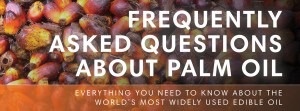 What is palm oil? Why are rainforests being burned down for palm oil? How can you help stop rainforests from being burned down for palm oil?
What is palm oil? Why are rainforests being burned down for palm oil? How can you help stop rainforests from being burned down for palm oil?
These are good questions—and we have answers.
Here’s everything you need to know about the world’s most widely used edible oil. Read all about it in this blog, or better yet, download this palm oil FAQ as a PDF and share it with everyone you know.
Top Ten Frequently Asked Questions about Palm Oil
1. What is palm oil?
Palm oil is a globally traded agricultural commodity that touches our lives in every trip we make to the supermarket. Palm oil is an edible vegetable oil derived from pulping the fruit of oil palms originally native to Africa. Palm oil is commonly used as a cooking oil in Africa, Southeast Asia and parts of Brazil and its consumption is on the rise worldwide. The recent rise in the use of palm oil in the US food industry has resulted largely from changed labeling requirements that have caused a switch away from using trans fats. Palm oil is semi-solid at room temperatures and along with coconut oil, is one of the few highly saturated vegetable fats.
2. Why is palm oil a problem?
Palm oil has become one of the world’s leading causes of rainforest destruction. Unchecked expansion has pushed palm oil plantations into the heart of some of the world’s most culturally and biologically diverse ecosystems and palm oil is among the biggest threats driving iconic wildlife species like the Critically Endangered Sumatran orangutan and the Endangered Borneo orangutan to the brink of extinction in Indonesia and Borneo Malaysia.
This large-scale destruction of rainforests and carbon-rich peatland landscapes is releasing globally significant quantities of carbon pollution into the atmosphere, making palm oil a major global driver of human induced climate change.
The production of palm oil is also responsible for widespread human rights violations as palm oil companies often forcefully remove Indigenous Peoples and rural communities from their lands. Child labor and modern day slavery are known to occur on palm oil plantations in both Indonesia and Malaysia.
3. What is ‘sustainable’ palm oil?
The term ‘sustainable palm oil’ has been diluted and overused as a greenwashing tactic to the point that it is no longer a useful term to distinguish good palm oil from bad. Consumers are being misled by labels on products that say ‘RSPO certified sustainable palm oil.’ Many of the companies that use these labels are in fact still causing rainforest and peatland destruction.
Companies that produce, trade and use palm oil must go beyond the inadequate standards of the RSPO to be truly responsible. This is why RAN is encouraging companies to only use ‘responsible’ palm oil. We use the term ‘responsible’ palm oil to describe palm oil that has been produced from known sources without contributing to deforestation, species extinction, high greenhouse gas emissions or human rights violations.
4. What about the Roundtable on Sustainable Palm Oil (RSPO)?
The RSPO is a multi-stakeholder certification system for palm oil. The RSPO holds promise, but as of yet it has failed to live up to its potential because the standards it uses to determine if a member company is ‘certified sustainable’ has major flaws. The RSPO continues to certify companies that are destroying rainforests and peatlands and causing high greenhouse gas emissions. The RSPO has a poor track record of enforcing its standards and resolving disputes between RSPO members and certified palm oil companies and rural communities.
Companies cannot just make commitments to buy palm oil from RSPO members or only use RSPO certified palm oil and consider the problem solved. Companies need to develop their own palm oil purchasing policy that requires their suppliers to provide them with truly responsible palm oil.
 5. What alternative oil do you recommend to replace palm oil?
5. What alternative oil do you recommend to replace palm oil?
RAN is asking snack food companies to reduce their overall consumption of controversial palm oil and to make sure that any palm oil they use has not resulted in forest destruction or human rights violations. Food manufacturing companies can also use oils that are not grown in the tropics and have been produced responsibly including olive oil, canola oil, corn oil and safflower oil. The American Heart Association also recommends eating these monounsaturated oils and polyunsaturated fats instead of processed palm oil. Another option in the tropics is coconut oil.
It is important to note that all edible oils have an environmental and social foot print and any oil or oil blend used to replace palm oil should meet the same rigorous environmental, social and supply chain transparency safeguards.
6. Is palm oil healthy?
The science is not entirely settled and health claims about the virtues of palm oil are largely hearsay and based on the properties of fresh and unprocessed palm oil and not the highly processed food additive widely used in packaged foods. The World Health Organization, the National Heart, Lung and Blood Institute, the National Institute of Diabetes and Digestive and Kidney Diseases and the USDA’s Agriculture Research Service all recommend against consuming palm oil and other tropical oils high in saturated fats.
7. What is palm oil used for?
Palm oil is found in roughly 50% of packaged goods sold in US or European grocery stores. Palm oil and its derivatives are used in a remarkable array of products, such as ice cream, cookies, crackers, chocolate products, cereals, breakfast bars, cake mixes, doughnuts, potato chips, instant noodles, frozen sweets and meals, baby formula, margarine, and dry and canned soups. Palm oil is also the most widely used frying oil in the world and is commonly used in the American fast food industry for products such as French fries.
The palm oil industry has grown dramatically over the past few decades and palm oil now accounts for a quarter of global vegetable oil consumption and nearly 60% of the global trade in vegetable oils. In the U.S. alone, palm oil imports have jumped 485% in the last decade. Besides foods, it is widely used in detergents, soaps, cosmetics and other household goods. It is also used as a biofuel.
8. What ingredient names is palm oil listed under?
Under current regulations, it is legal for food manufacturers to list palm oil simply as “vegetable oil.” Here is a partial list of other names for palm oil-derived ingredients:
- Palm Kernel Oil (PKO) and PKO fractionations: Palm Kernel Stearin (PKs); Palm Kernel Olein (PKOo)
- Partially Hydrogenated Palm and Palm Kernel Oil (PHP(K)O)
- Fractionated Palm and Palm Kernel Oil (FP(K)O)
- Organic Palm Oil and Palm Kernel Oil (OP(K)O)
- Palmitate – Vitamin A or Ascorbyl Palmitate
- Sodium Laureth Sulphate and Sodium Lauryl Sulphates
- Sodium dodecyl Sulphate (SDS or NaDS)
- Elaeis Guineensis
- Glyceryl Stearate and Stearic Acid
- Steareth -2 and Steareth -20
- Sodium Lauryl Sulphate and Sodium Lauryl sulfoacetate
- Hydrated palm glycerides
- Sodium isostearoyl lactylaye
- Cetyl palmitate and octyl palmitate
9. What is RAN’s palm oil campaign strategy? Why doesn’t RAN call for a full boycott?
RAN’s palm oil campaign is seeking to expose and break the link between America’s favorite snack foods and controversial palm oil that is driving forest destruction and human rights violations. We are raising awareness in the American public and mobilizing grassroots pressure to convince snack food companies to demand controversy free palm oil from their suppliers.
RAN is asking snack food companies to take the following steps to reform their palm oil supply chains:
1.Define their values including protecting forests and biodiversity and making the decision to eliminate controversial palm oil from their supply chains.
2.Develop and implement a palm oil purchasing policy that will build demand for palm oil that is produced with strict environmental and social safeguards.
3.Invest in understanding their supply chains so they can trace the palm oil they use and can tell customers where and how their palm oil was produced.
4.Make and implement a plan with a clear timeline to stop purchasing palm oil from controversial producers.
5.Require their suppliers to provide them with 100% responsible palm oil.
Palm oil has become so ubiquitous that an effective boycott would be nearly impossible. If our approach is successful, snack food companies will demand that their suppliers adopt safeguards and traders like Cargill and IOI will then need to provide an incentive for palm oil producers to meet the rising demand for responsible palm oil.
10. What can I do? How can I get involved?
The crisis caused by palm oil is urgent and the stakes are high, but luckily there is something you can do about it. First, we can all become more conscious of our own consumption and waste of highly processed foods manufactured by massive international corporations and make more fresh and local food choices.
Then, please join with RAN and send a message to America’s favorite 20 snack food companies that they need to cut controversial palm oil out of their supply chains.
Join the Palm Oil Action Team. RAN is building a national grassroots movement and we need your help!
Call or write your favorite snack food companies today and ask them to cut palm oil tied to rainforest destruction and human rights violations out of their supply chains.
Sign and deliver a ‘Call for Responsible Palm Oil’ comment card to your local grocery store that sells snack foods – or write your own.
Make a donation to RAN’s ambitious new campaign calling on the US snack food industry to help stop the destruction of Indonesia’s rainforests for palm oil.